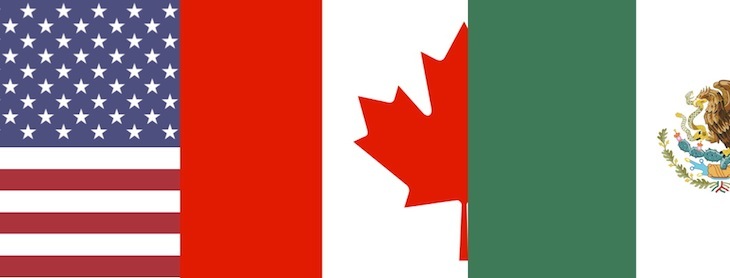Arkansas delegation reacts to Trump’s announcement on U.S.-Canada agreement
by October 1, 2018 5:05 pm 971 views

Out with the old acronym, in the with the new.
President Donald Trump said that the U.S. has completed its renegotiation of the North American Free Trade Agreement, NAFTA, and struck a new deal with the border countries of Canada and Mexico.
A U.S.-Mexico agreement was largely reached two weeks ago and on Monday (Oct. 1), negotiators announced that a U.S.-Canada deal has been reached. The new agreement will be called the United States–Mexico–Canada Agreement, or USMCA.
According to a White House statement and information provided by the U.S. Trade Representative’s office, the new USMCA would:
- Require 75% of auto manufacturing content to be produced in North America;
- Add rules to incentivize the use of high-wage manufacturing labor in the auto sector;
- Eliminate Canada’s “Class 7” program that allows lower priced dairy products in the U.S.;
- Keep the NAFTA provision of zero agricultural tariffs between the three countries;
- Modernizes intellectual property rights, including pharmaceutical and biologic drugs; and
- Institutes new rules on data transfer across borders.
A joint statement from U.S. Trade Representative Robert Lighthizer and Canadian Foreign Affairs Minister Chrystia Freeland read:
“Today, Canada and the United States reached an agreement, alongside Mexico, on a new, modernized trade agreement for the 21st Century: the United States-Mexico-Canada Agreement (USMCA). USMCA will give our workers, farmers, ranchers and businesses a high-standard trade agreement that will result in freer markets, fairer trade and robust economic growth in our region. It will strengthen the middle class, and create good, well-paying jobs and new opportunities for the nearly half billion people who call North America home.”
IMPACT ON ARKANSAS, REACTION
While specifics of the USMCA were not released and state-level impacts are not available, the restructuring of NAFTA, which went into effect 24 years ago, could have a major impact on Arkansas.
Canada is Arkansas’ top trading partner overall with nearly 69,000 Arkansas jobs dependent on the neighbors to the north. Another 41,000 jobs are affected by trade with Mexico. According to the World Trade Center Arkansas, Arkansas exports roughly $1.3 billion in goods to Canada and another $182 million in services.
The five largest markets for agricultural exports from Arkansas are Mexico (27%), Canada (16%), Haiti (10%), Hong Kong (6%) and Guatemala (5%), according to Agriculture & Agri-Food Canada.
Members of Arkansas’ Congressional delegation was positive, but cautious as members awaited more details.
Sen. John Boozman, R-Ark., said, “The announcement that a trade agreement has been reached with Canada and Mexico is very promising news and creates a sense of certainty for Arkansas’s manufacturers, small businesses and agriculture industry. Our neighbors to the north and south are our natural allies and trading partners, but that partnership must be mutually beneficial. I am pleased that Canada and Mexico came to the negotiating table, and together we were able to come to an agreement. America can compete with any nation in the world when the playing field is level. I welcome this announcement and look forward to reviewing the details of the agreement in depth to ensure it can achieve that goal.”
U.S. Rep. French Hill, R-Little Rock, said, “I was pleased to see that negotiators from the United States, Mexico, and Canada have successfully concluded a three-country effort to update and reform the 1992 NAFTA agreement. Canada and Mexico are the largest trading partners for Arkansas goods and services, thus a successful three-country negotiation was essential. Further, I am pleased that a dispute resolution mechanism was included. I look forward to studying the text of the results of the collective hard work of the negotiators.”
U.S. Rep. Bruce Westerman, R-Hot Springs, said, “President Donald Trump has delivered on a promise to the American people. The renegotiated free trade agreement between the United States, Canada, and Mexico connects North America’s economies in commerce while protecting American jobs. The agreement supports agriculture, manufacturing, and emerging fields in our evolving 21st Century economy in a way that has not been done before. It sets out clear rules on wages, acceptance of American agricultural goods, and more in a way that drives economic development here at home and encourages trade with our largest economic partners. I thank President Trump for his leadership and look forward to this new chapter in the economic history of the United States.”
U.S. Rep. Steve Womack, R-Rogers, said, “Modernizing policies to reflect the realities of the 21st century global economy is critical to ensuring our nation’s future prosperity. By standing up for U.S. workers and negotiating from strength, the administration has secured a new trade agreement that will further advance America’s interests and priorities. This pact will help level the playing field for Arkansas’s agriculture and business economies, creating freer and fairer markets with some of our most vital trading partners. I look forward to seeing our farmers, ranchers, and local businesses take advantage of the new opportunities this agreement will create once fully implemented.”
Gov. Asa Hutchinson released a statement via his Twitter account that read, “USMCA is good news for AR & AR farmers. The agreement will enable our agricultural producers to continue trade w/ our state’s export customers in Mexico & Canada. While I am still studying many of the details, this is a victory for American workers & Pres @realDonaldTrump. I have consistently said that the first goal of these negotiations should be to ‘do no harm’ & I am pleased that tariffs on agricultural products traded between the United States & Mexico will remain at zero.”
Talk Business & Politics will update this story as more details become available.
Editor’s note: Northwest Arkansas Business Journal editor Paul Gatling contributed to this report.
